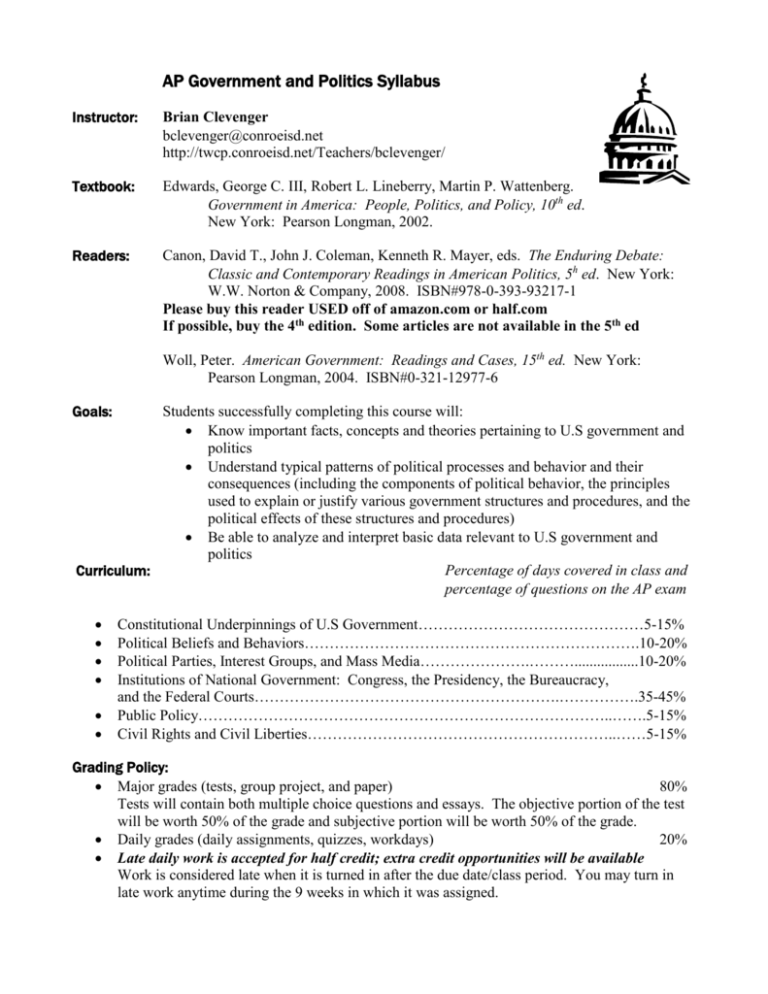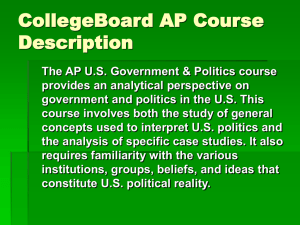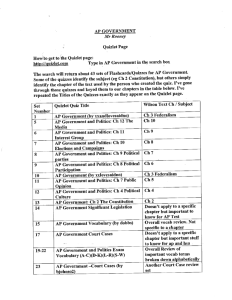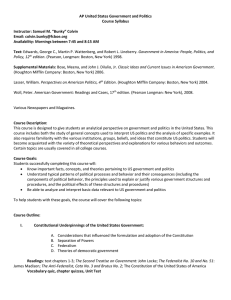
AP Government and Politics Syllabus
Instructor:
Brian Clevenger
bclevenger@conroeisd.net
http://twcp.conroeisd.net/Teachers/bclevenger/
Textbook:
Edwards, George C. III, Robert L. Lineberry, Martin P. Wattenberg.
Government in America: People, Politics, and Policy, 10th ed.
New York: Pearson Longman, 2002.
Readers:
Canon, David T., John J. Coleman, Kenneth R. Mayer, eds. The Enduring Debate:
Classic and Contemporary Readings in American Politics, 5h ed. New York:
W.W. Norton & Company, 2008. ISBN#978-0-393-93217-1
Please buy this reader USED off of amazon.com or half.com
If possible, buy the 4th edition. Some articles are not available in the 5th ed
Woll, Peter. American Government: Readings and Cases, 15th ed. New York:
Pearson Longman, 2004. ISBN#0-321-12977-6
Goals:
Students successfully completing this course will:
Know important facts, concepts and theories pertaining to U.S government and
politics
Understand typical patterns of political processes and behavior and their
consequences (including the components of political behavior, the principles
used to explain or justify various government structures and procedures, and the
political effects of these structures and procedures)
Be able to analyze and interpret basic data relevant to U.S government and
politics
Curriculum:
Percentage of days covered in class and
percentage of questions on the AP exam
Constitutional Underpinnings of U.S Government………………………………………5-15%
Political Beliefs and Behaviors………………………………………………………….10-20%
Political Parties, Interest Groups, and Mass Media………………….……….................10-20%
Institutions of National Government: Congress, the Presidency, the Bureaucracy,
and the Federal Courts…………………………………………………….…………….35-45%
Public Policy………………………………………………………………………..…….5-15%
Civil Rights and Civil Liberties……………………………………………………..……5-15%
Grading Policy:
Major grades (tests, group project, and paper)
80%
Tests will contain both multiple choice questions and essays. The objective portion of the test
will be worth 50% of the grade and subjective portion will be worth 50% of the grade.
Daily grades (daily assignments, quizzes, workdays)
20%
Late daily work is accepted for half credit; extra credit opportunities will be available
Work is considered late when it is turned in after the due date/class period. You may turn in
late work anytime during the 9 weeks in which it was assigned.
Materials:
Multi-subject spiral notebook or binder (you need a place to take notes and keep handouts)
Highlighters, pens, pencils
Class donation of _________________
AP Exam:
Every student enrolled in AP Government and Politics is expected to take the AP exam in
May. Certain scores on this test will result in college credit hours at most universities.
Tutorials and Make-Ups:
Tutorials for the class will be held every Tuesday from 2:45 –3:45 all year. Any other time for
tutoring needs to be scheduled with me.
Any missed quizzes or tests need to be made up within a week of the missed quiz or test during
my tutorial time, or scheduled independently with me. Also, make-up quizzes and tests forfeit
any curve that may have been given.
AP U.S Government and Politics Assignments
Daily Grades
Chapter Reading Questions and Quizzes: One per chapter. Students will be required to complete
the assigned reading questions over each chapter and turn them in on the day of the chapter quiz.
These questions need to be answered individually and handwritten. Random questions will be
chosen to be graded for correct answers. The reading questions will count for one homework grade.
The chapter quizzes will count as one homework grade.
The Enduring Debate Readings: One per unit. Students will be required to read assigned readings
for each unit and complete a bulleted summary of each chapter identifying the thesis, main points, and
conclusion. This is to be handwritten. The bulleted summary will be due any time before the unit test.
These will constitute one homework grade.
Unit 1: The Constitution
The Federalist, No. 51 – James Madison (p. 51-55)(or in textbook pp 701-702)
Unit 2: Federalism
The Price of Federalism – Paul Peterson (p.87)
Unit 3: Legislative Branch
Too Much of a Good Thing: More Representative Is Not Necessarily Better- John Hibbing and
Elizabeth Theiss-Moore (p. 151-157)
Unit 4: Executive Branch
Bureaucracy: What Government Agencies Do and Why They Do It-- James Wilson (p. 215224)
Unit 5: Judicial Branch
Storm Center: The Supreme Court in American Life-- David O'Brien (p. 255-262)
Unit 6: Civil Rights and Civil Liberties
In Defense of Prejudice-- Jonathan Rauch (p. 116-124)
Unit 7: Linkage Institutions
The Hyperpluralism Trap-- Jonathan Rauch (p. 459-166)
Workdays: Participation during workdays will count as one daily grade. Participation is mandatory –
you must be working on AP Government classwork.
AP U.S Government and Politics Assignments
Major Grades
Chapter Experts:
You will become the expert in the assigned chapter content. After reading the material, decide how
best to clearly communicate the information to your fellow students. You will have about forty
minutes to present the most important concepts and vocabulary to the class. Ask, “What do we really
need to know and what relates to other aspects of government policy or actions?” You are the teacher.
Use whatever method you believe will help others understand how the government works within this
topic. This will constitute one major grade
Required for all presentations and PHOTOCOPIED for the class:
1 ½ to 2 page bulleted summary of key elements in chapter – NO LONGER – be concise
Handout of vocabulary defined and examples given
Two thought questions students should be able to answer about this content
Each article in Enduring Debate which pertains to chapter content summarized with six bullet
points – include thesis, conclusion, key examples or explanation – required articles are listed
below.
Rubric will include:
Demonstration of clear understanding of chapter content (this does not mean reading your
power point, or outline word-for-word); Use of political science terminology in presentation
Thought questions relevant and clearly written
Bulleted outline effectively summarizes content
Vocabulary is clearly defined, explained, and examples are given
Supplemental reader’s content summary – you DO NOT need to present this information unless
you do it in an interesting way (do not just simply read your summary)
WOW Factor – going above and beyond – at teacher discretion
*try and incorporate this into the project rather than treat it as a separate project
***Remember this is a summary of most important and relevant information
Chapters and Enduring Debate Readings:
Chapter 7: Mass Media
o Media Bias and the Culture Wars – Robert Bresler
o The Search for Objectivity in Journalism – Howard Myrick
o Rethinking Objective Journalism – Brent Cunningham
Chapter 10: Elections and Voting Behavior
o The Unpolitical Animal: How Political Science Understands Voters – Louis Menand
o Run-Up to Election Exposes Widespread Barriers to Voting – People for the American
Way
o Make Way for Election Month: The Floridafication of Our Political Waters Continues
Unabated – John Fund
Chapter 17: Economic Policymaking
o The GDP Myth: Why ‘Growth’ Isn’t Always a Good Thing – Jonathan Rowe and
Judith
Silverstein
o How to Balance the Budget – Alice Rivlin and Isabel Sawhill
o Restrain Runaway Spending with a Federal Taxpayers’ Bill of Rights – Brian Riedl
Chapter 18: Social Welfare Policymaking
o Growing American Inequality: Sources and Remedies – Gary Burtless
o Providing Social Security Benefits in the Future: A Review of the Social Security
System and Plans to Reform It – David John
o What is Acceptable Risk? - Roger Scruton
Chapter 19: Health and Environmental Policymaking
o The Necessity of Free-Market Prices for Medical Care – Robert Gervais
o Bringing True Competitiveness to Health Care – Nina Owcharenko
o Now Can We Talk About Health Care? The Crisis That Never Went Away Has
Become Only More Complicated – Hillary Clinton
Chapter 20: Foreign and Defense Policymaking
o The Holocaust Shrug: Why is There So Much Indifference to the Liberation of Iraq? –
David
Gelernter
o What Went Wrong? The Miscalculations and Missteps That Led to the Current
Situation in Iraq – Richard Lowry
o Baghdad Year Zero – Pillaging Iraq in Pursuit of a Neocon Utopia – Naomi Klein
Supreme Court Opinion:
Each student will be given a hypothetical legal situation in which the U.S Supreme Court will make a
decision. The student will then write a concurring or dissenting opinion on the decision. This
assignment will constitute one major grade. More information will be given out during the second
nine weeks.
Requirements:
No longer than 3 pages, double spaced, 5 paragraphs
Introduction, stating opinion (1st paragraph)
Substantial use of judicial precedents to support opinion (body paragraph)
Substantial use of Constitution to support opinion (body paragraph)
Substantial use of statutory law to support opinion (body paragraph)
Conclusion, restating opinion (4th paragraph)
This is ANALYTICAL writing, not descriptive – no overuse of quotations
Works cited page in MLA-Style format







